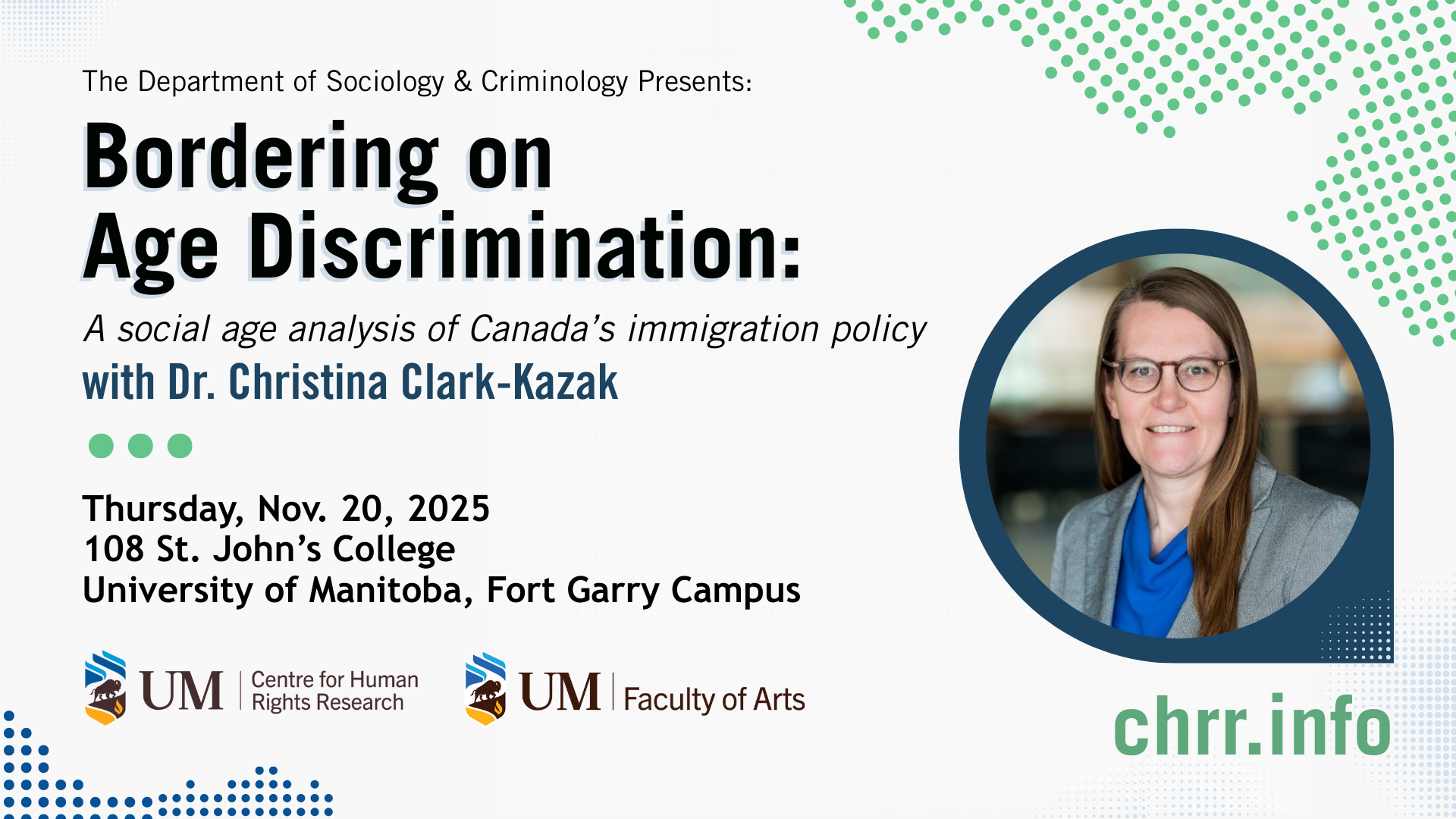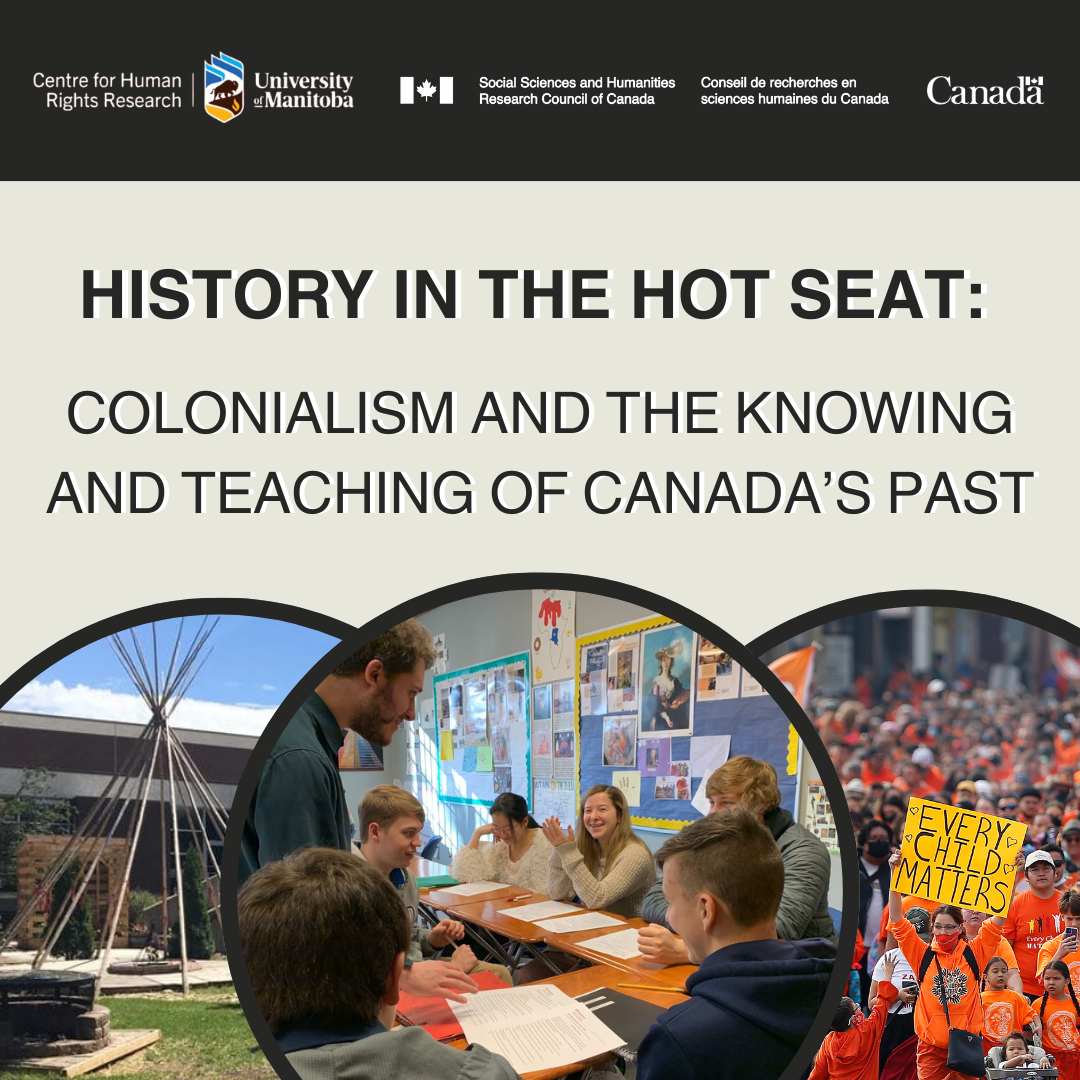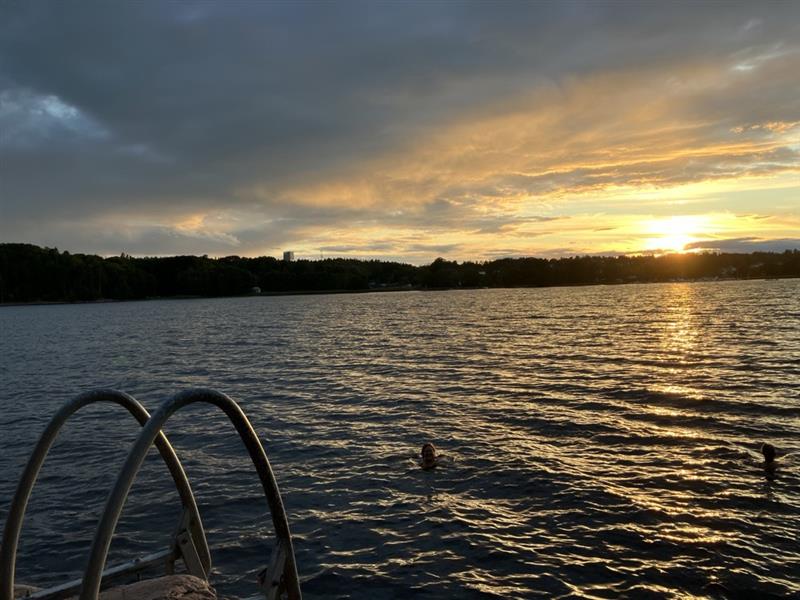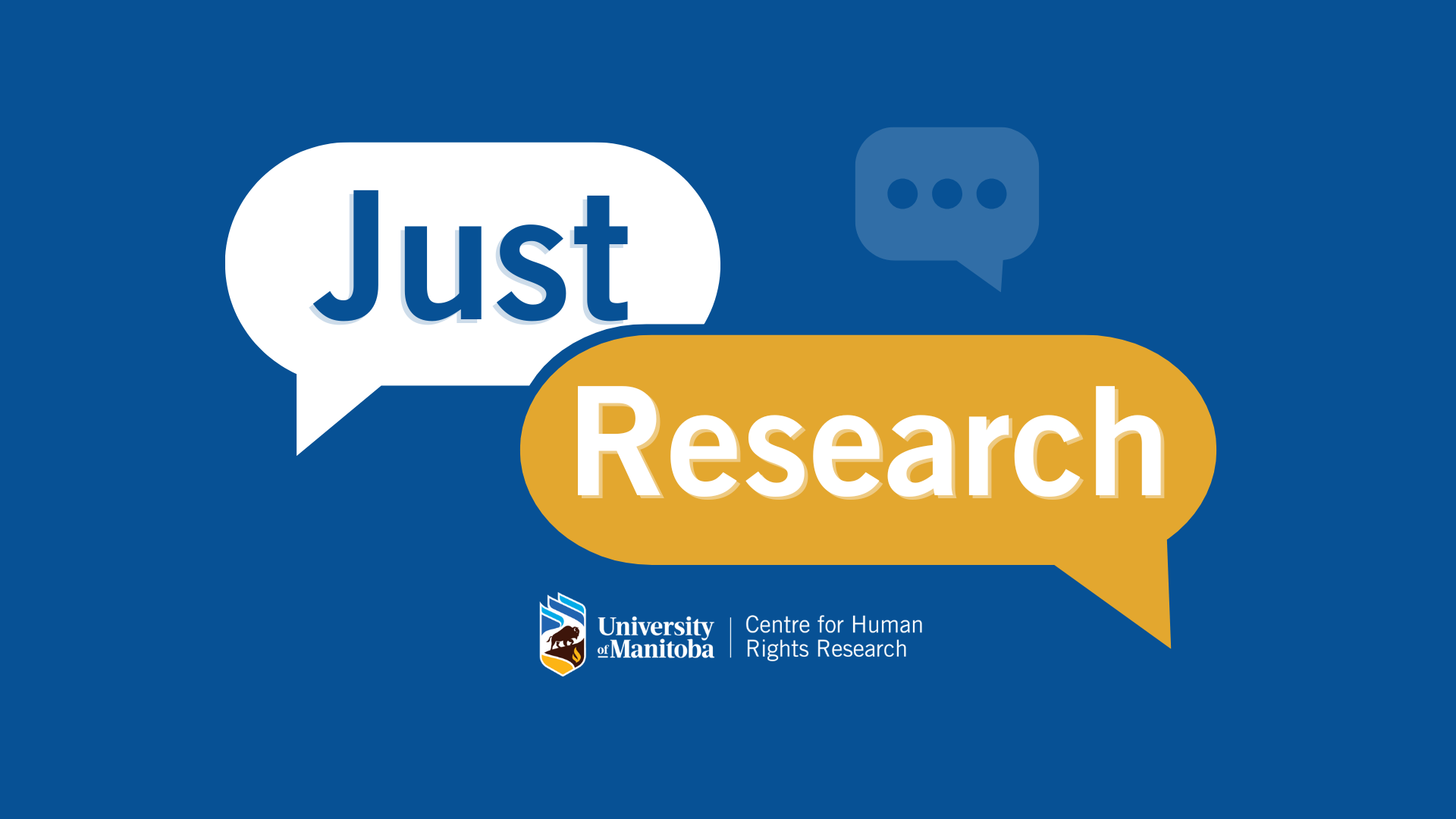Bordering on Age Discrimination: A social age analysis of Canada immigration policy
December 1, 2025
Angela Ciceron

On November 20, 2025, the Centre for Human Rights Research and the Department of Sociology and Criminology (Faculty of Arts) at the University of Manitoba hosted Dr. Christina Clark-Kazak for a lecture titled “Bordering on Age Discrimination: A Social Age Analysis of Canada’s Immigration Policy.”
In this lecture, Clark-Kazak draws from her forthcoming work on Age and Immigration Policy in Canada: Toward an Equitable Approach (UBC Press, 2026) where she uses a social age analysis to understand how Canadian immigration policies can discriminate on the basis of social age. Her analysis covers a broad range of immigration policies, from the points system to refugee settlement, as well as related areas such as immigration detention.
Watch the lecture below.

Investing for ourselves, and those downstream
Investing for ourselves, and those downstream
November 24, 2025
Jocelyn Thorpe and Adele Perry
Adele Perry and Jocelyn Thorpe respond to a City of Winnipeg Report outlining the importance of completing the final phase of the new North End Water Pollution Control Centre (NEWPCC) in a Winnipeg Free Press article published November 24, 2025.
We have invested large sums of money in infrastructure before.
You don’t often hear Winnipeggers complaining about the results: soft, clean drinking water thanks to the Shoal Lake aqueduct and flood protection thanks to the Red River Floodway.
A new city report outlines the importance of upgrading Winnipeg’s North End sewage treatment plant, which is responsible for treating 70 per cent of the city’s wastewater and all sewage sludge. The report focuses on the upgrades’ potential benefits to the city, including increased capacity to build new homes and businesses, and related economic growth.
It briefly mentions that upgrades to the plant are necessary in order to meet environmental regulations designed to protect waterways from the discharge of harmful materials that compromise the health of the Red River and Lake Winnipeg.
But nowhere does the report mention that Indigenous communities located downstream from Winnipeg are the ones bearing the brunt of Winnipeg’s sewage treatment shortcomings. Last year, in response to a sewage spill that resulted in over 228 million litres of sewage flowing into the Red River, 10 First Nations situated around Lake Winnipeg sued municipal, provincial and federal governments for the violation of their treaty rights, ongoing pollution of the lake, and its effects on the health and well-being of First Nations citizens.

Refusing to Harness a River: A Study of Dryland Farmers Resisting Irrigation in mid-20th Century Saskatchewan
Refusing to Harness a River: A Study of Dryland Farmers Resisting Irrigation in mid-20th Century Saskatchewan
October 30, 2025
Shannon Stunden Bower
On October 30, 2025, the University of Manitoba’s Just Waters project, Institute for the Humanities and Department of History hosted Dr. Shannon Stunden Bower for a talk titled, “Refusing to Harness a River: A Study of Dryland Farmers Resisting Irrigation in mid-20th Century Saskatchewan.” This talk focused on dryland farmers from Saskatchewan’s Outlook-Broderick area in their efforts to resist the Saskatchewan government’s attempts to compel them to irrigate. Drylander resistance illuminates key features of this agricultural community in the mid-20th century: the importance of the ideals of rights and democracy; the significance of women’s roles, and the persistence and creativity of those who sought to protect their own ideas of how best to make good lives and good livings. Watch a video of the talk below.

History in the Hot Seat: Colonialism and the Knowing and Teaching of Canada’s Past – A Final Report
History in the Hot Seat: Colonialism and the Knowing and Teaching of Canada’s Past - A Final Report
2024
Hannah Belec, Katja Buchholz, Jamie Nienhuysen, Adele Perry, Sean Carleton, Jocelyn Thorpe, and Pauline Tennent

In recent years, we have witnessed a sustained questioning of how we understand, remember, and celebrate Canada’s past in light of ongoing histories of colonization, dispossession, and systemic racism. In conventional scholarly publications, grey literature, and popular media, we can see a reconsideration of Canada’s past and how it should be taught, understood, and marked within and beyond academia. This reckoning with imperial and racial pasts is global in scope but has had a particular trajectory and impact within the context of Canada. Canada’s past has been in the hot seat. The History in the Hot Seat Knowledge Synthesis project identifies and assesses the state of current English-language knowledge in Canada that has been produced since History in the Hot Seat works to provide knowledge that will be valuable for academics, public history professionals and organizations, educators and others working to develop and sustain visions of Canada’s past that recognize the role of colonization, dispossession, and systemic racism in Canada’s past.
History in the Hot Seat is part of the 2024 Knowledge Synthesis Grant Competition, funded by the Social Sciences and Humanities Research Council (SSHRC) in partnership with Canadian Heritage, Genome Canada, and UK Research Innovation’s Arts and Humanities Research Council (UKRI-AHRC). The theme of the 2024 Knowledge Synthesis Grant Competition, “Evolving Narratives of Cultures and Histories,” aims to assess and mobilize the existing knowledge on how factors such as globalization, war, colonization, racism, slavery, climate change, technology, social media, and more have shaped or changed cultural and historical narratives.

Winnipeg, Wastewater & Environmental Racism Postcards
Winnipeg, Wastewater & Environmental Racism Postcards
November 4, 2025
Cameron Armstrong, Angela Ciceron and Sarah Deckert

On September 22, 2025, we met at the Assiniboine and Red Rivers to discuss how Winnipeg’s wastewater reflects and perpetuates environmental racism and colonialism. Dr. Kathy Bird spoke about the interconnectedness of the waters and reminded us that what we do to the waters in Winnipeg impacts our neighbours downstream. With profound insight and storytelling, she called us to a deep respect for the waters, both in spirit and in action. Dr. Jocelyn Thorpe shared about the reality of sewage that flows into the rivers not only when pipes break but when we have a heavy rainfall and the combined sewers overflow. Finally, Councillor Brian Mayes brought our attention to the need for federal support for the North End Sewage Treatment Plant upgrades, which would greatly reduce the amount of nutrients that flow into Lake Winnipeg.
We provided the postcards below as a way for attendees to advocate for the waters, and for our neighbours downstream. Please feel free to print these postcards and send to your MPs, MLAs and city councillors with a personal message about your connection to and hope for the waters. Below the postcards we have provided a few additional resources, including links to help you find your MP, MLA and city councillor, and some prompts for writing an effective letter.

An Evening on Cuban-Canadian encounters through music, art, politics and more with Karen Dubinsky and Jorge Nállim
An Evening on Cuban-Canadian encounters through music, art, politics and more with Karen Dubinsky and Jorge Nállim
October 29, 2025
Centre for Human Rights Research

On October 24, 2025, the CHRR, in collaboration with McNally Robinson Booksellers and the UM Institute for the Humanities hosted historians Karen Dubinsky and Jorge Nállim for an evening on Cuban-Canadian encounters through music, art, politics and more at the Atrium in McNally Robsinson Booksellers – Grant Park. This evening included a reading from Dubinsky’s latest book, Strangely, Friends: A History of Cuban-Canadian Encounters (Between the Lines Books) and a Q&A with the audience, followed by a book signing. Watch a recording of the book launch below.

World Water Week 2025: Ripple Effects
World Water Week 2025: Ripple Effects
October 23, 2025
Sarah Deckert
We understand that water is central to life. We are made of water and it is to be cherished. We respect water, work with it, live with it and nurture it. We are the custodians, guardians and knowledge holders of the lands, coasts, waters, ice and sky in our Homelands. We have sustainably managed, observed and cared for our lands, waters, and natural resources for the health and benefit of both people and Homelands for millennia. Our spiritual connections, ecological and biocultural knowledge, including lived experiences of climate change, have been, and continue to be, passed down from generation to generation through our stories, art, song, dance and cultural life…
Excerpts from “A message from the Indigenous Peoples Delegation to World Water Week“
Early, full and effective participation by Indigenous Peoples in governance and decision-making for environmental management, cultural heritage protection, and climate change is essential to enabling a sustainable future. We need to be empowered in generating global climate change solutions that embed both Indigenous knowledge systems and science.
Joining the Indigenous Peoples Delegation to World Water Week as an ally was a privilege. Held from August 25-29, 2025 in Stockholm, Sweden, World Water Week has been increasing efforts to highlight Indigenous voices over the past several years. This year, the delegation included Indigenous delegates from Australia, Aotearoa New Zealand, Brazil, Canada, Fiji, Nepal, United States, Sweden and more.
Along with Just Waters researcher Nicole J. Wilson, I had the opportunity to build relationships with and learn from an incredible group of Indigenous experts, water protectors, scientists and advocates. I learned too much for one blog post, so I’ll share a few snapshots.
Sámi presenters Sara-Elvira Kuhmunen and Inger Axiö Albinsson spoke about Sámi experiences of green colonialism. Green energy systems such as windfarms and hydroelectric dams are built in Sápmi, the land of the Sámi that covers parts of Norway, Sweden, Russia and Finland, and are lauded by governments and the public. Stockholm subway station walls are decorated with images of Samuel L. Jackson gazing off into the distance while holding a bag of Vattenfall Windfarmed Seaweed Snacks.
Just before I left for Sweden, I heard about the story of a 113-year old church, and the entire town of Kiruna, being moved five kilometers away to make room for a rare earth mine expansion.

Kiruna and the Vattenfall windfarms are both in Sápmi. Likewise, both projects, and many others, impact reindeer migration paths and grazing grounds—which in turn impacts Sámi livelihoods and culture. Listening to Sara-Elvira and Inger gave me a case of déja-vu—Manitoba Hydro anyone?
The many sessions on nature-based solutions (NbS) caught my interest. While I’m sure there are nuances I didn’t catch, my impression of NbS is that they can be summed up like this: Don’t drain wetlands and other watery places. Dig holes to collect water. Replace concrete with native plants. Follow Indigenous peoples’ lead. Leave forests alone. It almost seems too simple and yet, can you imagine the outrage if we tried to remove downtown parking spots to create a rain garden?
In a powerful moment, Professor Bradley Moggridge from the Kamilaroi Nation of Australia called for the implementation of “culture-based solutions,” which will achieve the intended results of NbS—supporting biodiversity, storing carbon, and more— while also protecting and revitalizing Indigenous cultures.

Dr. Tafue Lusama, a Tuvaluan Indigenous man, spoke to a whole of life philosophy that recognizes the interrelatedness of all things. He highlighted the special knowledge that children have about the lands and waters and encouraged the use of cultural indicators of biodiversity and water quality in addition to technical western scientific monitoring. He was also the only speaker I heard who referenced the experience of being in the water, saying, “You have only to immerse yourself to be refreshed.” As a person who ended every day of the conference by swimming in the 17°C water of the Baltic Sea, I wholeheartedly agree!
In each Indigenous-led session, some version of the opening quote was repeated: “Early, full and effective participation by Indigenous Peoples in governance and decision-making for environmental management, cultural heritage protection, and climate change is essential to enabling a sustainable future.”
While attendees listened attentively and applauded enthusiastically, the question remains: will they go back to their roles in project management, engineering and conservation with good intentions alone or will they offer early, full and effective participation to Indigenous communities that are impacted by their projects?
Powerful words spoken by Indigenous Hawaiian KaiLei’a Duriano are still ringing in my ears:
You have to be vulnerable and willing to risk… When you ask us, we are risking everything. I am pouring my entire cup into this larger cup, and if you are not willing to risk even a drop, I challenge you to reevaluate your role in working with Indigenous communities because it isn’t a project for us—it is a ripple into our tidal waves that we feel for generations to come.
Kailei’a duriano
What kind of ripples are you creating?

Environmental Racism: A Resource Guide
Environmental Racism: A Resource Guide
October 23, 2025
Jenny Amadi, Angela Ciceron, Sarah Deckert and Florence Lange
On September 22, 2025, we met at the Assiniboine and Red Rivers to discuss how Winnipeg’s wastewater reflects and perpetuates environmental racism and colonialism. Dr. Kathy Bird spoke about the interconnectedness of the waters and reminded us that what we do to the waters in Winnipeg impacts our neighbours downstream. With profound insight and storytelling, she called us to a deep respect for the waters, both in spirit and in action. Dr. Jocelyn Thorpe shared about the reality of sewage that flows into the rivers not only when pipes break but when we have a heavy rainfall and the combined sewers overflow. Finally, Councillor Brian Mayes brought our attention to the need for federal support for the North End Sewage Treatment Plant upgrades, which would greatly reduce the amount of nutrients that flow into Lake Winnipeg.
This resource guide was created as a starting point for those seeking to learn more about environmental racism.
Download the screen reader friendly Environmental Racism Resource Guide here:

Just Research: A Podcast – Episode 1
Just Research: A Podcast - Episode 1
October 6, 2025
Angela Ciceron

If you’re interested in water justice, you’ll be interested in the first episode of Just Research. Just Research is a podcast series from the Centre for Human Rights Research at the University of Manitoba. Hosted by Dr. Pauline Tennent and Dr. Adele Perry, the podcast highlights researchers from the UM community and beyond doing work in human rights and social justice in a variety of disciplines.
This season focuses on researchers whose work engages with each of the CHRR’s research themes: Borders and Human Rights, Indigenous Peoples and Human Rights, Reproductive and Bodily Justice, and Water Rights and Justice.
Episode 1: Looking Back on the CHRR and Water Research with Helen Fallding
In the first episode of Just Research, CHRR director Dr. Adele Perry and former CHRR manager Helen Fallding look back to the CHRR’s longstanding work in water rights and justice. In this conversation, they talked about the CREATE H2O program, its interdisciplinary, foundational work in water and sanitation in First Nations communities, and its legacy through the Just Waters project.
Listen now:


Just Research: A Podcast – Season 1
Just Research: A Podcast - Season 1
October 6, 2025
Angela Ciceron

Just Research is a podcast series from the Centre for Human Rights Research at the University of Manitoba. Hosted by Dr. Pauline Tennent and Dr. Adele Perry, the podcast highlights researchers from the UM community and beyond doing work in human rights and social justice in a variety of disciplines.
This season focuses on researchers whose work engages with each of the CHRR’s research themes: Borders and Human Rights, Indigenous Peoples and Human Rights, Reproductive and Bodily Justice, and Water Rights and Justice.
Episode 1: Looking Back on the CHRR and Water Research with Helen Fallding
In the first episode of Just Research, CHRR director Dr. Adele Perry and former CHRR manager Helen Fallding look back to the CHRR’s longstanding work in water rights and justice. In this conversation, they talked about the CREATE H2O program, its interdisciplinary, foundational work in water and sanitation in First Nations communities, and its legacy through the Just Waters project.
Listen now:
Episode 2: On Borders and Human Rights with Dr. Lori Wilkinson
In this episode of Just Reseach, CHRR manager Dr. Pauline Tennent speaks with Dr. Lori Wilkinson, a professor in Sociology at University of Manitoba, about her research on borders and human rights. Dr. Wilkinson’s research has touched on a wide variety of topics surrounding the lived experiences of migrants, refugees, and newcomers in Canada, including their experiences with sexual and gender-based violence.
Listen now:
- Sisic, Mia, Evangelia. Tastsoglou, Lori Wilkinson, Myrna Dawson, Catherine Holtmann, Chantelle Falconer, “The Continuum of Gender-Based Violence Experienced by Migrant and Refugee Women in Canada: Perspectives from Key Informants.” In Special Topic on “Gender and the Continuum of Violence in Migration,” guest-edited by E. Tastsoglou, M. Dawson, J. Freedman, C. Holtmann. In the journal Sociology, Frontiers, 2024
- Luo, Yazhi and Lori Wilkinson (2023) “Asian international students in a mid-sized Canadian City: A Case study of the University of Manitoba” Chapter 14, pp. 202-216 in Asian international students in Canadian universities: Internationalization, racialization and inclusion. Ann H. Kim, Elizabeth Buckner, and Jean Michel Montsion eds. Milton Park, UK: Routledge Press.
- Wilkinson, Lori and Sally Ogoe (2020) “Friendly Manitoba? An Examination of Racism and Xenophobia during the COVID-19 Pandemic” COVID-19 in Manitoba: Public Policy Responses to the First Wave Andrea Rounce, Karine Levasseur, and Shannon Furness eds. Winnipeg: University of Manitoba Press.
Episode 3: On Reproductive and Bodily Justice with Dr. Lindsay Larios
In this episode of Just Research, CHRR manager Dr. Pauline Tennent talks to Dr. Lindsay Larios, an assistant professor in the Faculty of Social Work at the University of Manitoba, about her research in reproductive justice. Dr. Larios’ work explores access to reproductive justice and care for migrants in Manitoba through community-based research approaches.
Listen now:
- https://chrr.info/research-themes/research-themes/reproductive-and-bodily-justice/
- https://chrr.info/person/people-_network/lindsay-_larios/
- https://lindsaylarios.com/
- https://www.instagram.com/reprojusticeresearchmb/
- https://chrr.info/current-projects-2/past-projects/period-poverty-and-equity-on-campus-and-beyond/
- Tennent, P., Alemaio, B., Belec, H., Hunter, M., Larios, L., Perry, A., Romero, V., Smith, J., & Vickar, C. (2024). A Report on Period Poverty and Equity, on Campus and Beyond. Winnipeg, MB: Centre for Human Rights Research, University of Manitoba.
- Larios, L., Larsen, P., Olanubi, O., & Oviosun, J. (2023) “Healthcare is a human right”: International student speak out on healthcare inaccessibility in Manitoba. Winnipeg, MB: Canadian Centre for Policy Alternatives — Manitoba.
- Larios, L. (2023). Precarious reproductive citizenship: Employment protections for pregnant precarious status migrants in Canada. Citizenship Studies. DOI: 10.1080/13621025.2022.2073970
- Larios, L. and Cowman, E. (2025). Working toward reproductive justice in Manitoba. Winnipeg, MB: Canadian Centre for Policy Alternatives — Manitoba.
Episode 4: On Indigenous Peoples and Human Rights with Brenda Gunn
On the last episode of Just Research, CHRR director Dr. Adele Perry speaks to Brenda Gunn, a professor in Robson Hall – Faculty of Law at the University of Manitoba, about her research on Indigenous peoples and human rights. Professor Gunn’s work has encompassed a wide variety of topics in this area, including Indigenous and treaty rights in Manitoba, and international law and Indigenous rights.
Listen now:
- https://chrr.info/research-themes/research-themes/reproductive-and-bodily-justice/
- https://chrr.info/person/people-_network/lindsay-_larios/
- https://lindsaylarios.com/
- https://www.instagram.com/reprojusticeresearchmb/
- https://chrr.info/current-projects-2/past-projects/period-poverty-and-equity-on-campus-and-beyond/
- Tennent, P., Alemaio, B., Belec, H., Hunter, M., Larios, L., Perry, A., Romero, V., Smith, J., & Vickar, C. (2024). A Report on Period Poverty and Equity, on Campus and Beyond. Winnipeg, MB: Centre for Human Rights Research, University of Manitoba.
- Larios, L., Larsen, P., Olanubi, O., & Oviosun, J. (2023) “Healthcare is a human right”: International student speak out on healthcare inaccessibility in Manitoba. Winnipeg, MB: Canadian Centre for Policy Alternatives — Manitoba.
- Larios, L. (2023). Precarious reproductive citizenship: Employment protections for pregnant precarious status migrants in Canada. Citizenship Studies. DOI: 10.1080/13621025.2022.2073970
- Larios, L. and Cowman, E. (2025). Working toward reproductive justice in Manitoba. Winnipeg, MB: Canadian Centre for Policy Alternatives — Manitoba.


Contact Us
We’d love to hear from you.
442 Robson Hall
University of Manitoba
Winnipeg, Manitoba
R3T 2N2 Canada
204-474-6453
Quick Links
Subscribe to our mailing list for periodic updates from the Centre for Human Rights Research, including human rights events listings and employment opportunities (Manitoba based and virtual).
Land Acknowledgement
The University of Manitoba campuses are located on original lands of Anishinaabeg, Ininew, Anisininew, Dakota and Dene peoples, and on the National Homeland of the Red River Métis.
Centre for Human Rights Research 2023© · Privacy Policy

